12 Best Climate Disclosure Management Platforms for 2025
Karel Maly
October 4, 2025
In 2025, robust climate disclosure has transitioned from a peripheral activity to a central pillar of corporate strategy. With regulations like the Corporate Sustainability Reporting Directive (CSRD) becoming mandatory, organisations face immense pressure to collect, manage, and report their environmental data with unprecedented accuracy and transparency.
Spreadsheets and manual processes are no longer viable. They create significant risks of non-compliance, reputational damage, and missed opportunities for operational improvement. The right climate disclosure management platform can transform this challenge into a competitive advantage, automating complex data collection, ensuring audit-readiness, and uncovering actionable insights to drive decarbonisation. To truly grasp the significance of these platforms, it's essential to understand the wider movement towards corporate responsibility, including examining sustainability strategies in the retail industry, which drives the demand for robust disclosure tools.
This guide provides an in-depth evaluation of the best climate disclosure management platforms on the market. We move beyond marketing claims to offer a comprehensive resource, helping you select a partner that not only guarantees compliance but also aligns with your long-term sustainability goals. Each review includes a detailed breakdown of features, ideal use cases, pricing considerations, and practical limitations, complete with screenshots and direct links to help you make an informed decision. We will analyse leading solutions from Workiva and Persefoni to specialised tools like Sweep and Plan A, providing the clarity needed to navigate this critical investment.
1. Carbonpunk
Best For: Enterprises with Complex Supply Chains Seeking Automated Emissions Reduction
Carbonpunk stands out as one of the best climate disclosure management platforms for large organisations that need to master the complexities of supply chain emissions. Its core strength lies in its AI-driven engine, which transforms the arduous task of carbon tracking from a reactive, manual process into a proactive, automated strategic advantage. The platform directly integrates with major logistics providers, ingesting shipment data in real-time to provide a granular and highly accurate (over 95%) view of a company's carbon footprint.
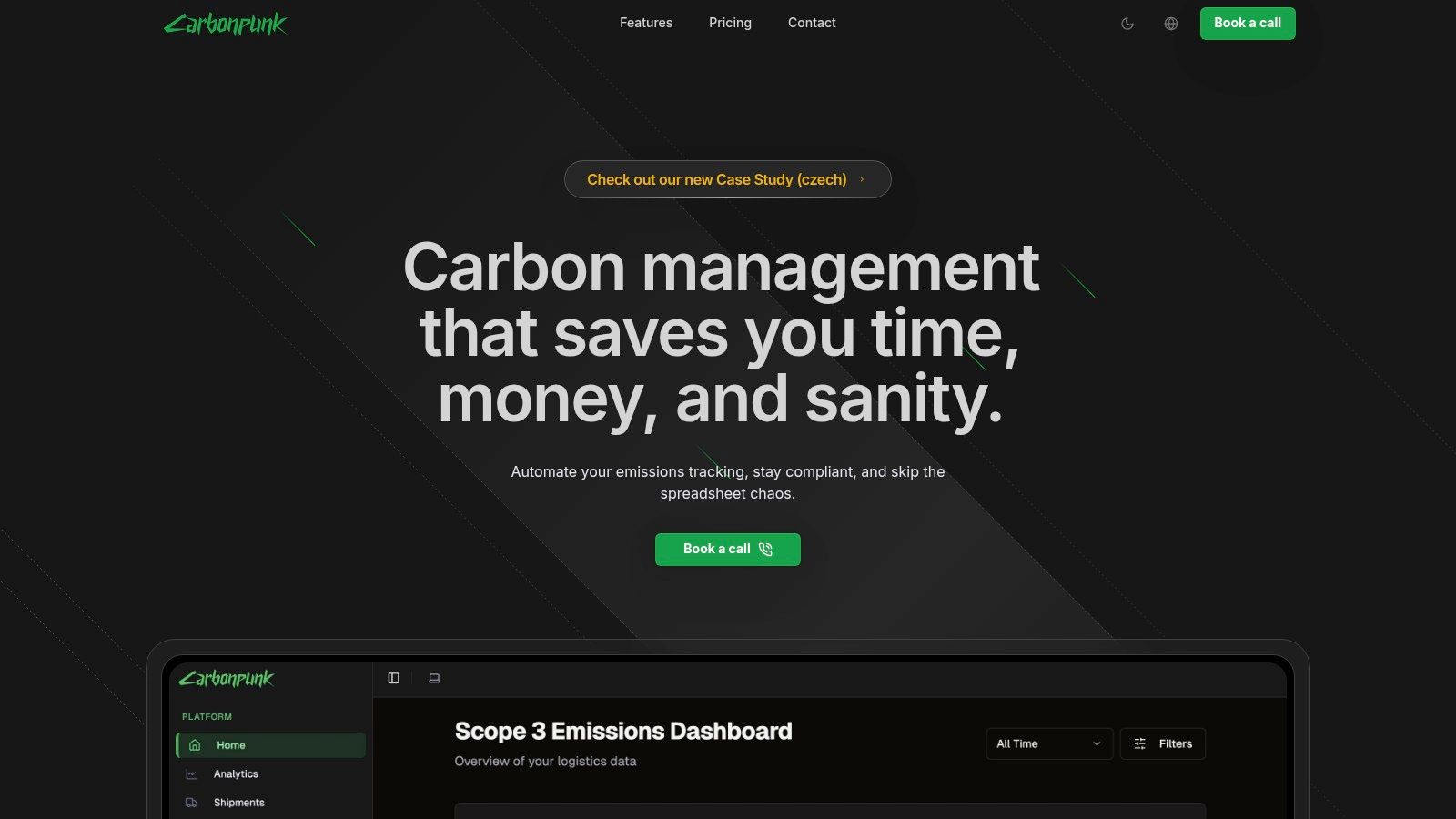
Unlike platforms that simply report historical data, Carbonpunk's AI delivers actionable, forward-looking insights. It analyses transport routes and modes, providing concrete recommendations that can reduce emissions by a significant 20–30%. This unique capability shifts the focus from mere compliance to tangible impact, helping logistics and sustainability managers achieve measurable cost savings and environmental progress simultaneously.
Key Features and Use Cases
- Automated Logistics Integration: Seamlessly connects with logistics systems to automate the collection of shipment data, eliminating the need for manual CSV uploads and reducing the risk of human error. This is ideal for organisations managing thousands of shipments across multiple carriers.
- AI-Powered Optimisation: The platform’s analytics engine suggests alternative transport modes and optimised routes to minimise CO₂ output. A practical use case involves a multinational retailer identifying and shifting specific freight from air to sea or rail for less time-sensitive goods, directly cutting its Scope 3 emissions.
- Audit-Ready Reporting: Carbonpunk automates the generation of reports compliant with major global standards, including the GHG Protocol, TCFD, and CDP. This feature is invaluable for compliance teams preparing for annual disclosures or third-party audits.
- Predictive Forecasting Dashboards: Customisable dashboards provide continuous analytics and predictive modelling. This allows Chief Sustainability Officers to benchmark performance against targets, forecast future emissions based on business growth, and identify potential security or compliance gaps before they become critical issues.
Website: https://www.carbonpunk.ai/en
2. Workiva
Workiva stands out as a comprehensive, audit-ready reporting platform designed for enterprises that require rigorous, integrated financial and sustainability disclosures. It excels at unifying disparate teams, such as finance, legal, and sustainability, onto a single platform, ensuring data consistency and traceability from source to final report. This makes it one of the best climate disclosure management platforms for organisations preparing for the stringent requirements of audited reports like the CSRD.
The platform's strength lies in its robust controls and workflow management. Every data point, edit, and comment is tracked, creating a clear audit trail that is invaluable for verification. For European companies, Workiva's ESG Explorer provides pre-built content aligned with ESRS, directly mapping requirements to other frameworks like TCFD and GRI. This streamlines the complex process of multi-framework reporting. The recent addition of Workiva Carbon provides dedicated tools for carbon accounting and decarbonisation pathway modelling.
Key Information
- Best For: Enterprise-level organisations needing a unified, audit-grade platform for both financial and ESG reporting, particularly for CSRD compliance.
- Pricing: Quote-based enterprise pricing. Implementation often involves professional services from Workiva or partners like the Big Four.
- Unique Feature: Direct, API-level integration with the CDP, allowing users to populate and submit their CDP questionnaire directly from the Workiva platform, significantly reducing manual effort.
Pros:
- Audit-Grade Controls: Provides unparalleled traceability and workflow history, crucial for assurance.
- Unified Platform: Seamlessly connects financial data with sustainability metrics, breaking down internal silos.
- Strong Partner Ecosystem: Benefits from established implementation accelerators and support from major consultancy firms.
Cons:
- Enterprise Focus: Pricing and complexity may be prohibitive for smaller organisations.
- Implementation Overhead: Requires significant change management and a structured implementation process.
Website: https://www.workiva.com
3. Persefoni
Persefoni has carved out a unique position in the market by offering a powerful, free-tier carbon accounting and climate disclosure platform, making it highly accessible for organisations beginning their sustainability journey. It focuses on providing a streamlined, user-friendly experience for calculating a comprehensive Scope 1, 2, and 3 carbon footprint. This approach democratises access to enterprise-grade climate data management, positioning it as one of the best climate disclosure management platforms for companies that need robust functionality without an initial large-scale investment.
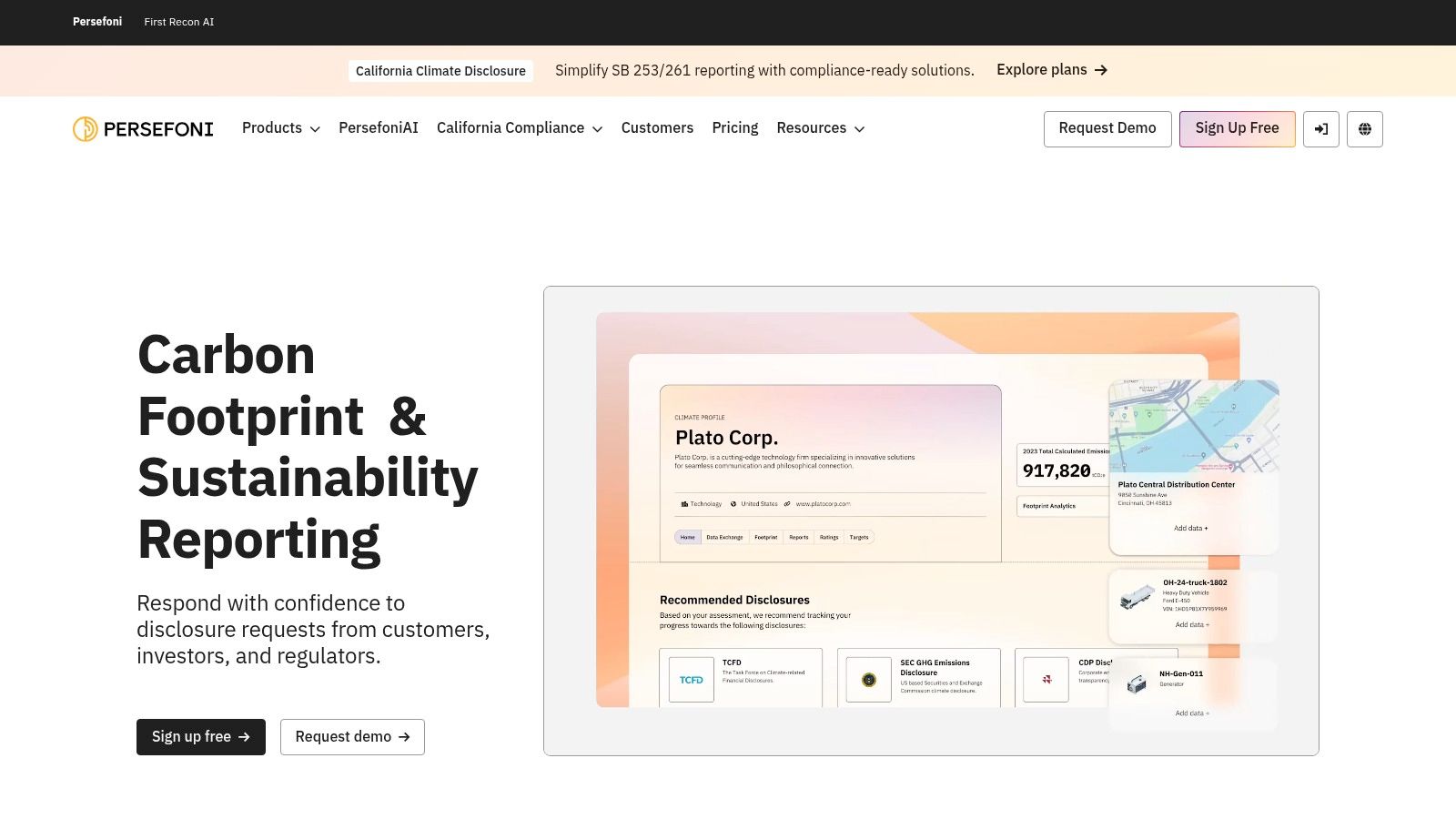
The platform is built on a foundation of rigorous greenhouse gas accounting principles and supports major regulatory frameworks, including CSRD, the SEC climate rule, and California’s new climate laws. Its AI-powered tools, such as the AI Copilot and anomaly detection, assist users in improving data quality and simplifying the complexities of data collection. This combination of accessibility, regulatory alignment, and intelligent data management makes Persefoni an excellent entry point into sophisticated climate reporting.
Key Information
- Best For: Small to medium-sized enterprises (SMEs) and larger organisations taking their first step into comprehensive, auditable carbon accounting and regulatory reporting.
- Pricing: Offers a free "Pro" plan with full Scope 1–3 calculation capabilities. Paid enterprise tiers are quote-based and add advanced features and support.
- Unique Feature: Its free, self-service tier (Persefoni Pro) provides full GHG Protocol-compliant Scope 1, 2, and 3 carbon accounting, a feature typically reserved for paid enterprise software.
Pros:
- Highly Accessible: The free plan removes the financial barrier to entry for comprehensive carbon footprinting.
- Excellent User Experience: Designed for fast onboarding and ease of use, even for non-sustainability experts.
- AI-Assisted Data Quality: Integrated AI tools help ensure data accuracy and streamline the validation process.
Cons:
- Paid Upgrades Needed: Advanced reporting outputs, scenario modelling, and dedicated concierge support are limited to paid enterprise plans.
- Primarily Carbon-Focused: While excellent for climate, it is less of an all-encompassing ESG platform compared to some competitors.
Website: https://www.persefoni.com
4. Watershed
Watershed provides a dedicated climate platform focused on granular emissions measurement and enterprise-grade decarbonisation. It is specifically engineered for companies that need to go beyond basic reporting to actively manage their climate programme, making it a strong contender among the best climate disclosure management platforms for those with ambitious net-zero targets. The platform excels at automating carbon accounting across Scopes 1, 2, and 3, using a methodology backed by a team of climate scientists.
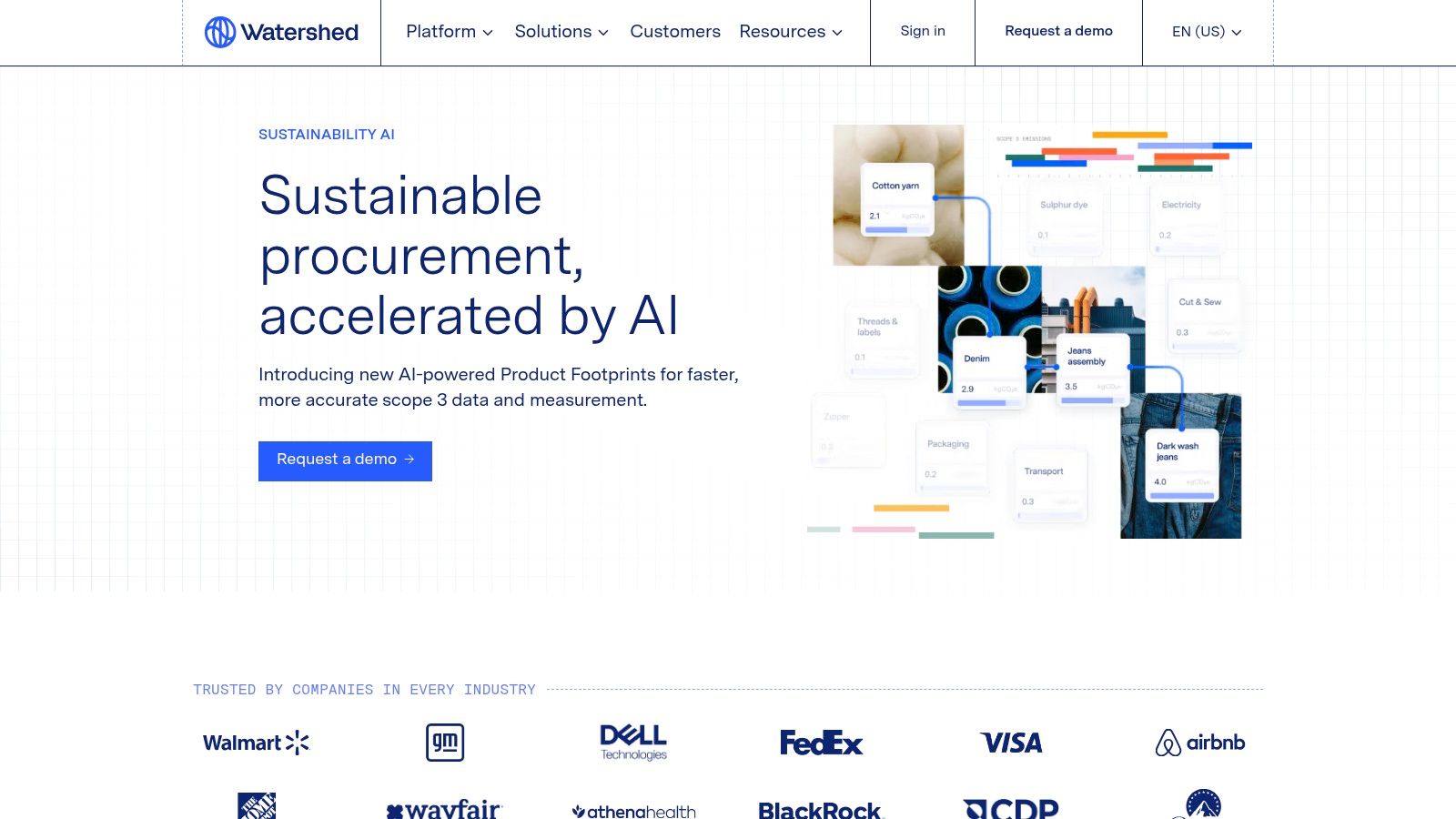
The platform's strength is its dual focus on rigorous data and actionable insights. Watershed not only calculates a company’s footprint but also provides tools to model and execute reduction strategies. For organisations with complex supply chains, its supplier engagement tools are particularly powerful, enabling data collection on emissions, water, waste, and biodiversity directly from partners. This is crucial for building a comprehensive, assurance-ready dataset for regulations like the CSRD, for which Watershed offers specific, ESRS-aligned workflows and templates to streamline compliance.
Key Information
- Best For: Large, multinational enterprises with complex supply chains seeking a comprehensive platform for carbon accounting, decarbonisation planning, and EU regulatory compliance.
- Pricing: Quote-based enterprise pricing. The model is tailored to company size, complexity, and the specific modules required (e.g., carbon accounting, supplier engagement, disclosures).
- Unique Feature: The "Watershed Marketplace" which connects companies with a curated selection of high-quality carbon removal projects, green power, and sustainable aviation fuel, directly integrating procurement into the decarbonisation strategy.
Pros:
- Action-Oriented: Moves beyond reporting to provide robust tools for planning and executing decarbonisation initiatives.
- Strong EU Focus: Offers dedicated, submission-ready disclosure workflows specifically for CSRD and ESRS.
- Supplier Engagement: Provides excellent tools for collecting primary data from suppliers, enhancing Scope 3 accuracy.
Cons:
- Premium Pricing: Designed for the enterprise market, its pricing structure is not accessible for smaller businesses.
- Sales-Led Process: Requires direct engagement with the sales team for pricing and onboarding, which can lengthen the procurement cycle.
Website: https://watershed.com
5. IBM Envizi ESG Suite
IBM Envizi positions itself as an enterprise-grade, single system of record for all ESG data, designed to manage the full spectrum of climate disclosure and sustainability performance management. It provides a comprehensive suite of tools for data capture, normalisation, and GHG emissions calculation, making it a powerful solution for large organisations grappling with complex data from disparate sources. Envizi's architecture is built for auditability, offering transparent data lineage and robust workflow approvals.
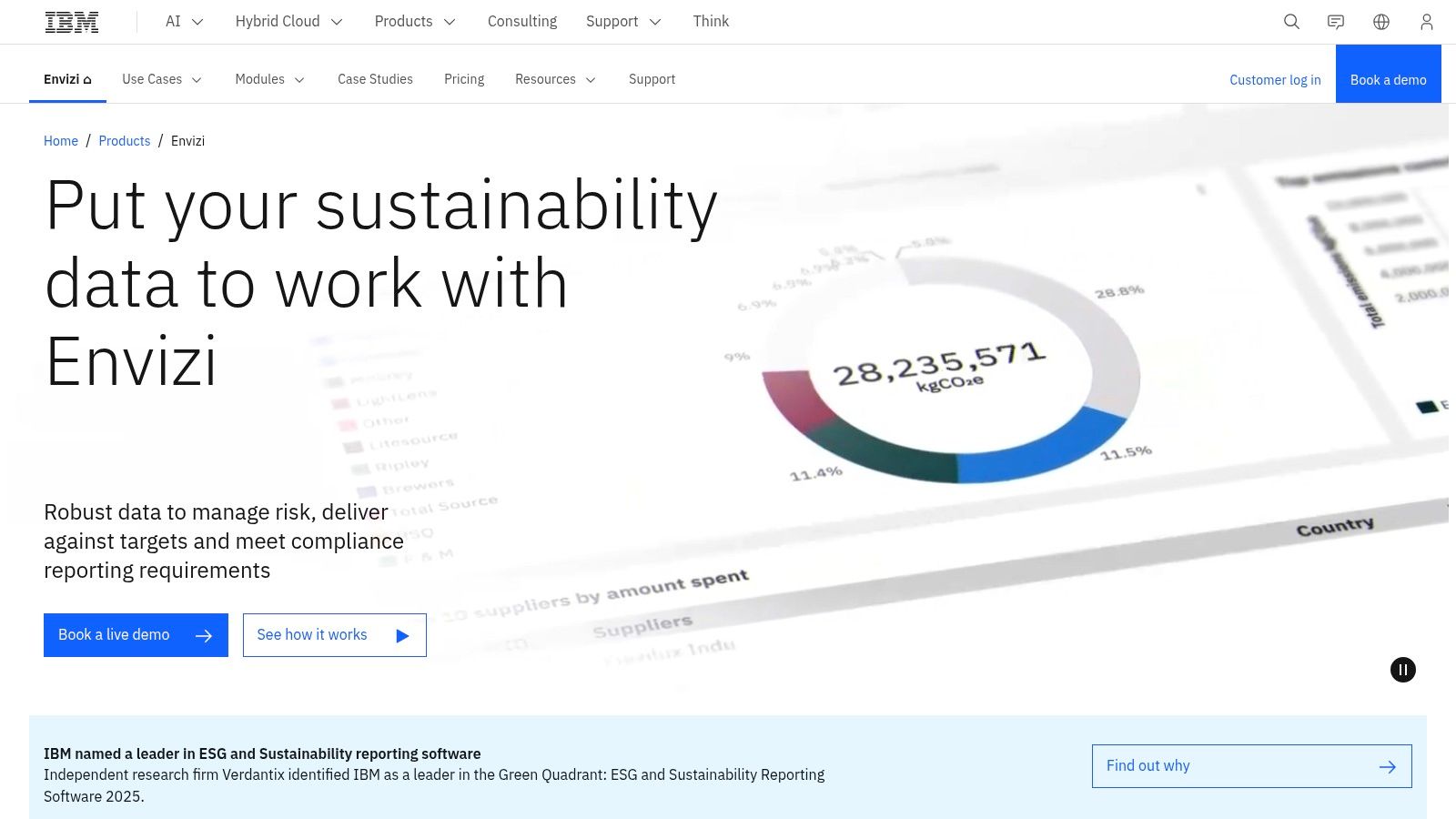
The platform is particularly adept at handling the detailed requirements of the CSRD, with embedded ESRS questions and a unified interface that supports various disclosures. This capability allows teams to manage multiple frameworks like GRI, SASB, and TCFD from one central hub, ensuring consistency and efficiency. Recognised by analysts like IDC MarketScape, Envizi is one of the best climate disclosure management platforms for businesses that require a high degree of data governance and a structured, scalable approach to their ESG reporting strategy. For further insights on what to look for, you can learn more about choosing an ESG SaaS platform.
Key Information
- Best For: Large enterprises seeking a single, auditable system of record to consolidate complex ESG data and manage multi-framework reporting.
- Pricing: Quote-based enterprise pricing model, tailored to module selection and organisational scale.
- Unique Feature: A powerful "single ledger" data foundation that allows for sophisticated data health checks and provides a complete, auditable trail from data point to final disclosure.
Pros:
- Strong Auditability: Provides robust audit trails, data lineage, and workflow approvals essential for verification.
- Comprehensive Framework Support: Natively supports a wide range of frameworks beyond CSRD, including GRI, SASB, and TCFD.
- Powerful Data Management: Excels at consolidating and normalising data from hundreds of sources into a reliable single source of truth.
Cons:
- Enterprise-Oriented: The platform's complexity and pricing structure are primarily designed for large corporations, not SMEs.
- Significant Implementation Effort: Requires a dedicated project team and structured change management to fully leverage its capabilities.
Website: https://www.ibm.com/products/envizi
6. Wolters Kluwer CCH Tagetik
Wolters Kluwer's CCH Tagetik positions itself as a finance-grade ESG performance management solution, built on the foundation of its established Corporate Performance Management (CPM) platform. This connection is its key differentiator, allowing organisations to link non-financial sustainability data directly with financial planning, budgeting, and consolidation processes. This makes it an excellent choice among climate disclosure management platforms for companies that view ESG not just as a compliance exercise but as a core component of their financial strategy and performance.
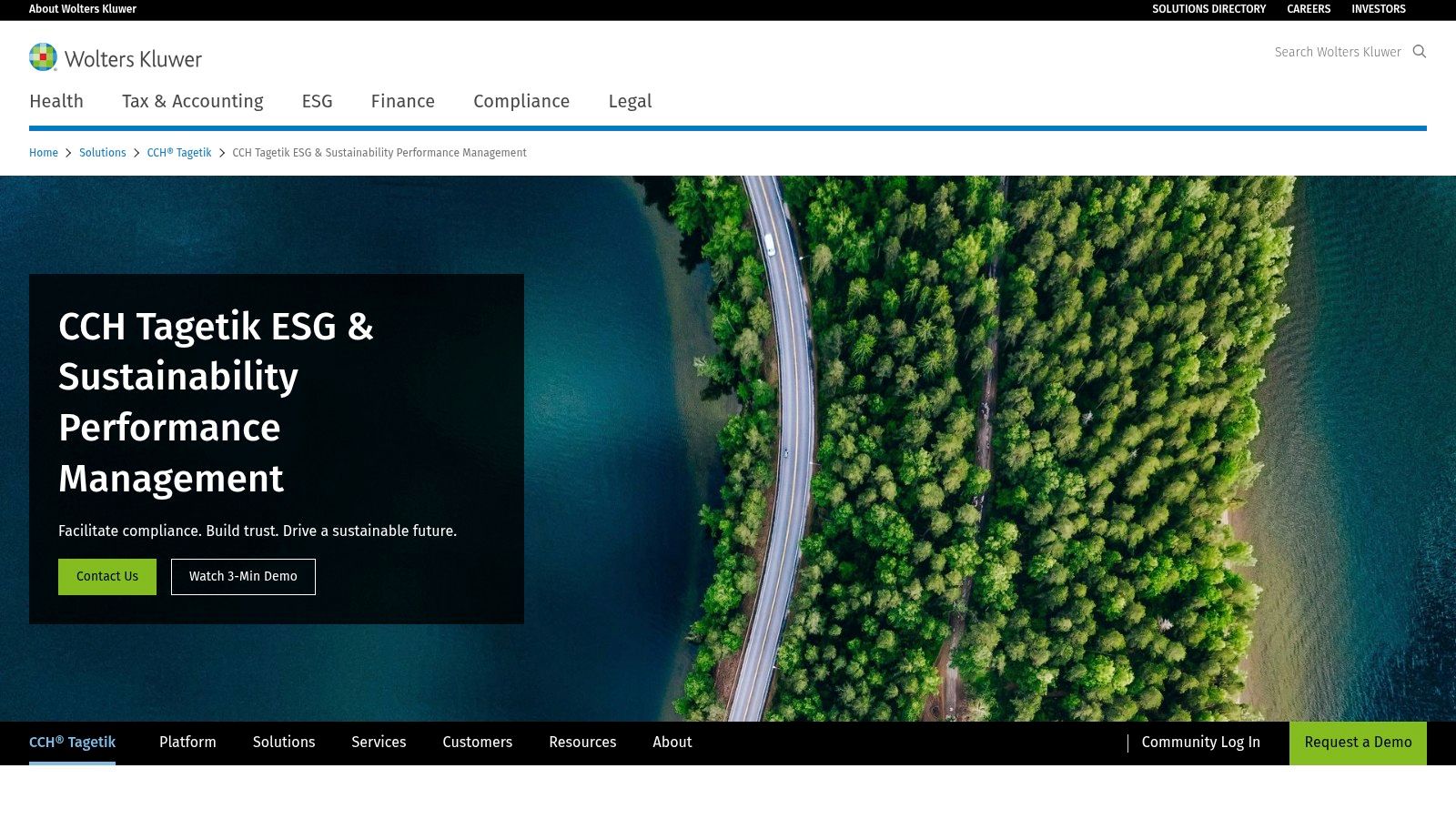
The platform offers a pre-packaged ESG and Sustainability solution that includes pre-configured GHG calculations, CSRD disclosure content, and specific functionalities for the EU Taxonomy. It is designed for assurance, with robust workflows, audit trails, and standard reports that help satisfy verifiers. For organisations already using Wolters Kluwer’s Enablon for operational ESG data collection, CCH Tagetik provides a powerful integration for a seamless flow of information from the field to the final disclosure report, creating a unified and controlled environment.
Key Information
- Best For: Enterprises, particularly those already using CPM/EPM systems, that want to deeply integrate ESG data into their core financial processes.
- Pricing: Enterprise-level licensing, which requires engaging with their sales team for a custom quote and demonstration.
- Unique Feature: Its native integration with the finance function, allowing sustainability data to be managed with the same rigour and control as financial data within a single, unified platform.
Pros:
- Deep Financial Integration: Directly links ESG metrics with corporate performance management for strategic decision-making.
- Assurance-Ready: Built-in controls, workflows, and audit logs are designed to meet the demands of external assurance.
- Analyst Recognised: A well-established and award-winning platform in the corporate performance and ESG reporting space.
Cons:
- Enterprise Focus: The platform's complexity and pricing model are primarily suited for large, multinational corporations.
- Requires Vendor Engagement: Access is typically through a formal sales process, including demos and proofs of concept, rather than self-service trials.
Website: https://www.wolterskluwer.com/solutions/cch-tagetik/esg-sustainability-performance-management
7. Diligent ESG
Diligent ESG leverages its deep-rooted expertise in governance and compliance to offer a robust platform for climate disclosure and sustainability management. It is designed for organisations that prioritise integrating ESG into their broader risk management and governance frameworks. The platform provides a structured approach to data collection, carbon accounting, and reporting, making it one of the best climate disclosure management platforms for companies looking to connect sustainability performance with board-level oversight.
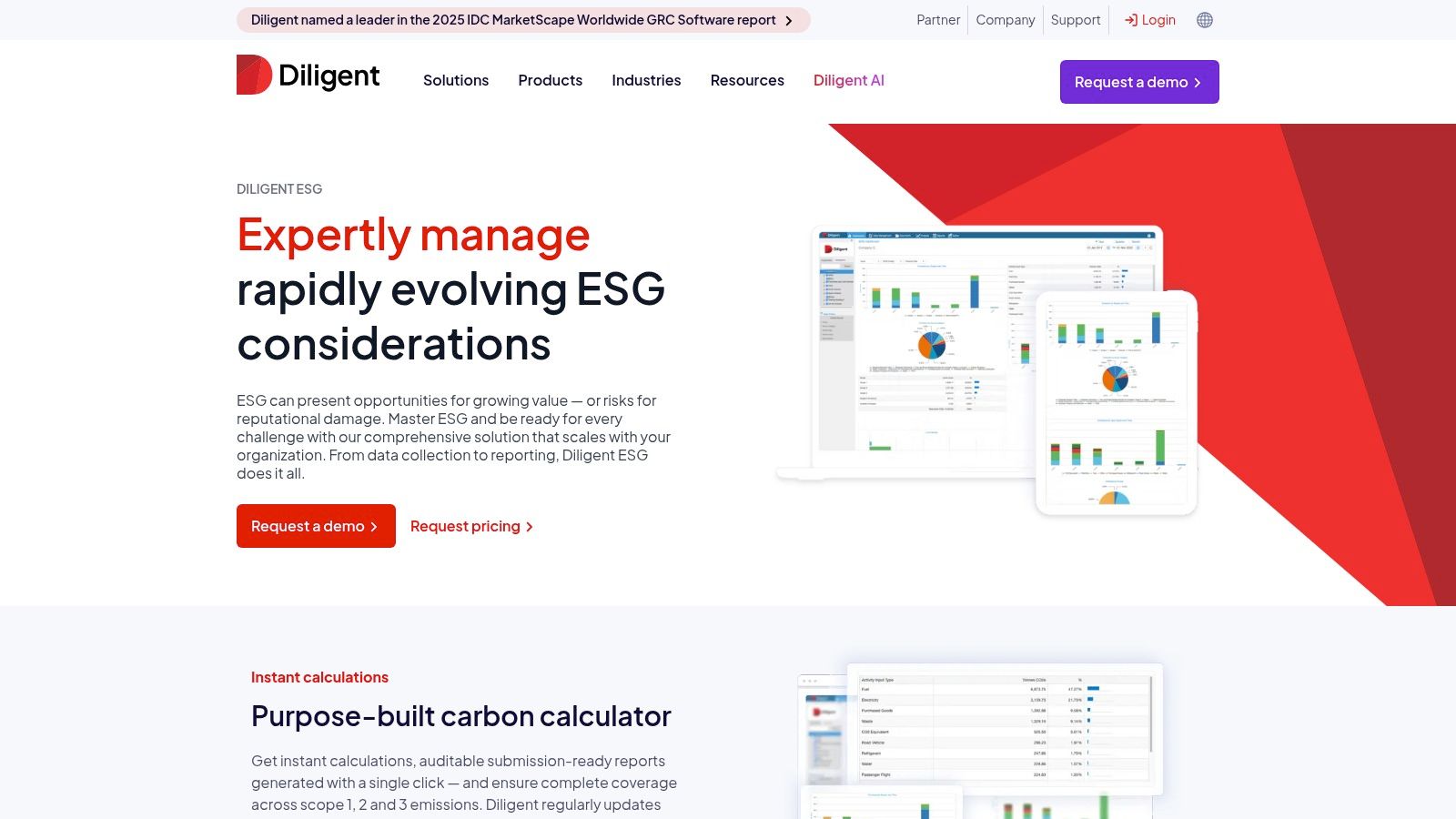
The platform features a powerful carbon calculator backed by over 70,000 regularly updated emissions factors, ensuring accurate GHG inventories. For European companies, Diligent offers ready-made CSRD report modules, including templates for ESRS 2, which helps streamline the complex double materiality and reporting processes. This focus on structured, compliant reporting makes it a reliable choice for teams navigating new regulatory landscapes. You can learn more about how tools like Diligent simplify disclosure automation.
Key Information
- Best For: Companies seeking to integrate ESG and climate reporting directly into their existing governance, risk, and compliance (GRC) functions.
- Pricing: Transparent, tiered annual pricing available directly via the AWS Marketplace, with custom enterprise quotes also offered.
- Unique Feature: Its availability on the AWS Marketplace with clear package tiers allows for straightforward procurement and deployment, bypassing lengthy enterprise sales cycles.
Pros:
- Transparent Procurement: Clear package options and pricing on AWS Marketplace simplify purchasing.
- Strong Governance Focus: Excellent for organisations that view ESG as an extension of corporate governance and risk management.
- Comprehensive Emissions Factors: A vast, updated library of factors supports accurate carbon accounting.
Cons:
- Module-based Activation: Some advanced CSRD features require specific modules to be enabled by customer success, which may add an extra step.
- GRC-centric Interface: The user experience is heavily influenced by its GRC roots, which may feel less specialised than a pure-play climate platform.
Website: https://www.diligent.com/products/diligent-esg
8. Datamaran
Datamaran carves out a unique niche not as an end-to-end reporting tool, but as a specialised, AI-powered platform for mastering the critical first step of disclosure: materiality assessment. It focuses specifically on providing a dynamic, evidence-backed process for identifying and validating material topics, which is a foundational requirement for frameworks like the CSRD. Instead of being a data repository, it acts as a strategic intelligence engine that complements other platforms by delivering the "why" behind an organisation's reporting focus.
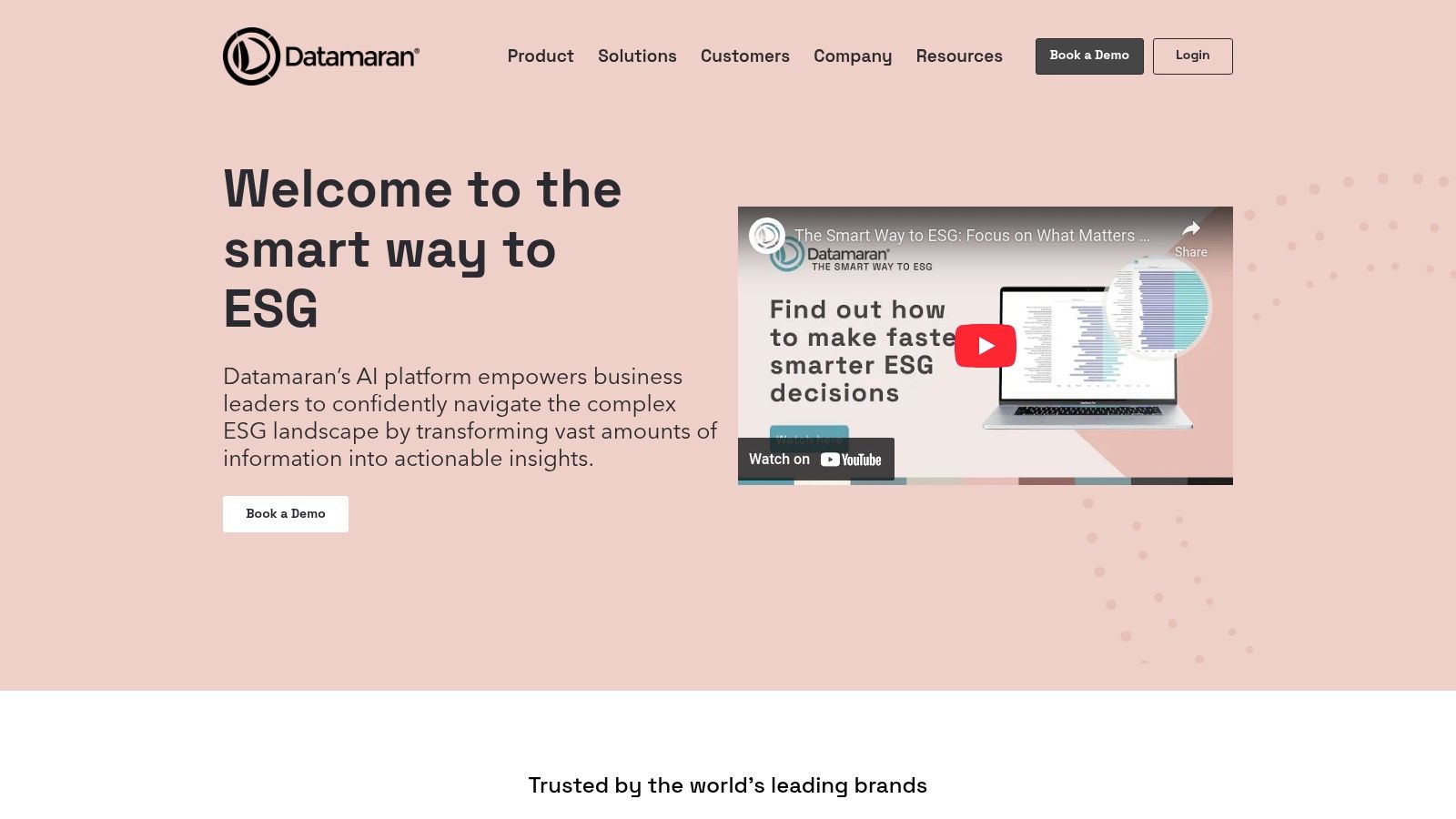
The platform’s core strength is its ability to perform and continuously monitor a double materiality assessment (DMA) with speed and rigour. Datamaran’s DMA Evaluate module allows companies to map stakeholder interests, regulatory pressures, and value chain impacts, providing a structured workflow that produces a transparent, auditable justification for topic selection. This makes it one of the best climate disclosure management platforms for organisations that need to build a defensible and dynamic materiality process to underpin their entire ESG strategy and reporting.
Key Information
- Best For: Companies needing a robust, auditable, and data-driven process for their CSRD double materiality assessment that can be continuously monitored.
- Pricing: Quote-based subscription pricing, varying based on modules and scope of use.
- Unique Feature: Continuous monitoring of material topics, allowing users to receive alerts when the relevance of a topic changes due to shifts in regulation, media, or stakeholder sentiment.
Pros:
- Purpose-Built for Materiality: Offers deep, specialised functionality for CSRD materiality that general platforms lack.
- Reduces Consultant Dependency: Empowers in-house teams to manage their materiality process with AI-driven insights.
- Strong Audit Trail: Every step of the assessment is documented, providing clear evidence for auditors and stakeholders.
Cons:
- Specialised Focus: It is not a complete ESG data management or reporting suite and must be used alongside other tools.
- AI-Driven Approach: Requires teams to trust and understand an AI-based methodology for topic identification and weighting.
Website: https://www.datamaran.com
9. Nasdaq Metrio
Nasdaq Metrio positions itself as an end-to-end ESG data management solution, extending beyond pure disclosure into stakeholder communication. Acquired by Nasdaq, the platform leverages the exchange's market infrastructure credibility to offer a robust tool for collecting, analysing, and reporting sustainability data. It is particularly well-suited for organisations that want to not only meet compliance requirements like CSRD but also to communicate their ESG story effectively through public-facing sustainability websites and reports generated directly from the platform.
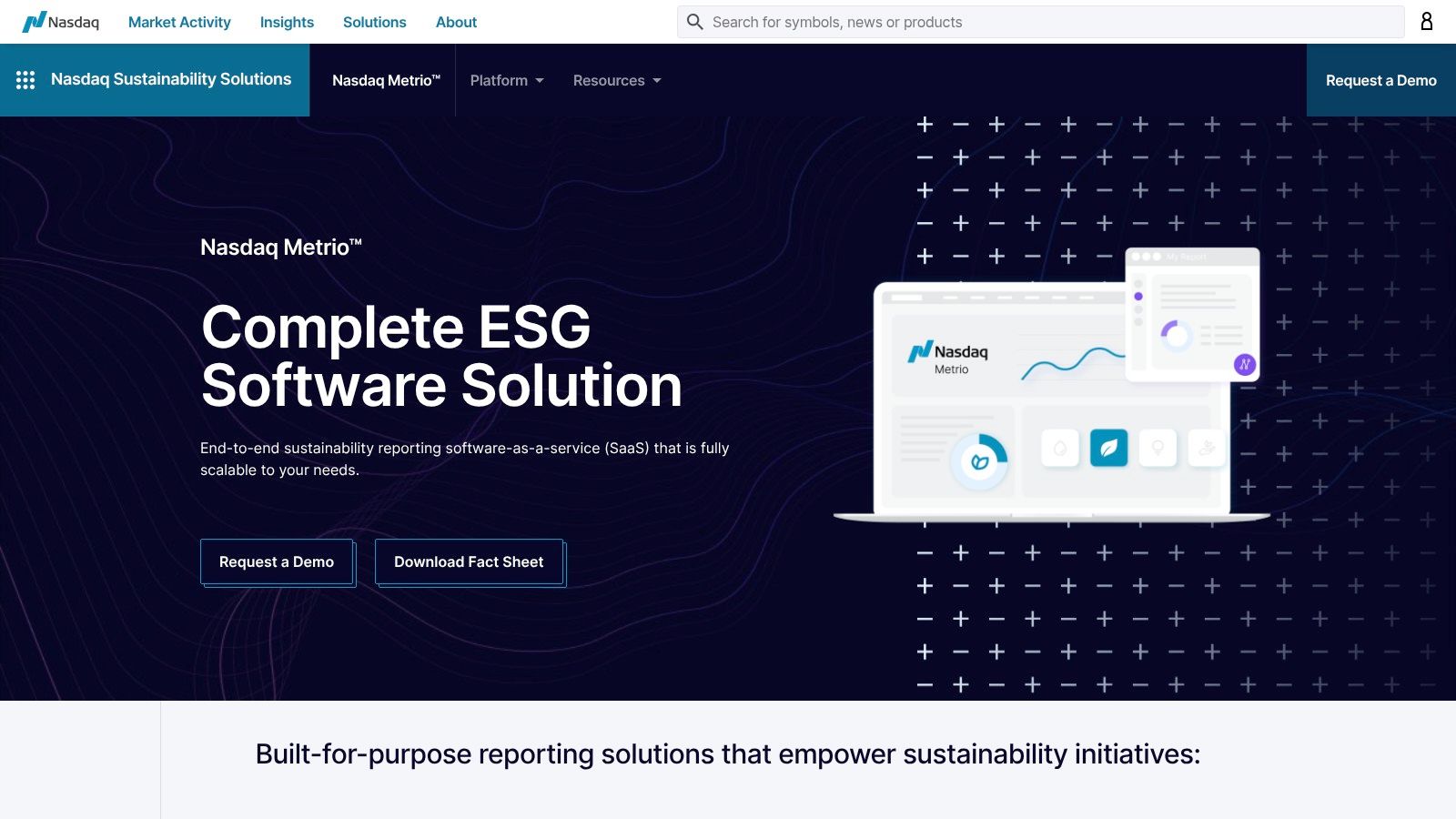
The platform supports a comprehensive range of frameworks and is designed to produce audit-ready outputs, making it a reliable choice for companies under regulatory scrutiny. A standout aspect is its emphasis on demonstrating the financial benefits of sustainability initiatives. Nasdaq Metrio commissioned a Forrester Total Economic Impact (TEI) study, which provides users with a clear framework for modelling the ROI of their ESG investments. This unique value proposition helps sustainability teams build a stronger internal business case for their programmes, a common challenge in many organisations.
Key Information
- Best For: Companies wanting to integrate their compliance reporting with public-facing ESG communication and those needing to build a strong internal business case for sustainability investments.
- Pricing: Quote-based, with pricing varying by the specific modules required.
- Unique Feature: The ability to create and publish stakeholder-ready sustainability websites directly from the platform's verified data, ensuring consistency between internal reporting and external communication.
Pros:
- Backed by Nasdaq: Offers the credibility and stability of a major global financial technology company.
- Transparent ROI Modelling: The Forrester TEI study provides a unique, data-backed tool for justifying ESG programme spend.
- Integrated Communications: Unifies internal data management with external stakeholder reporting and websites. For more on how Nasdaq Metrio compares to other top carbon footprint tracking software, see our 2025 review.
Cons:
- Longer Implementation: Full implementation can take several months, requiring significant planning.
- Modular Pricing: The cost can escalate depending on the number of features and modules selected.
Website: https://www.nasdaq.com/solutions/sustainability/metrio
10. Sweep
Sweep positions itself as an all-in-one, EU-born platform meticulously designed to guide organisations through the complexities of CSRD compliance. It offers a structured, workflow-driven approach that demystifies processes like double materiality assessments, data gap analysis, and policy creation. This European focus makes it one of the best climate disclosure management platforms for companies prioritising strict alignment with ESRS and EU data governance standards.
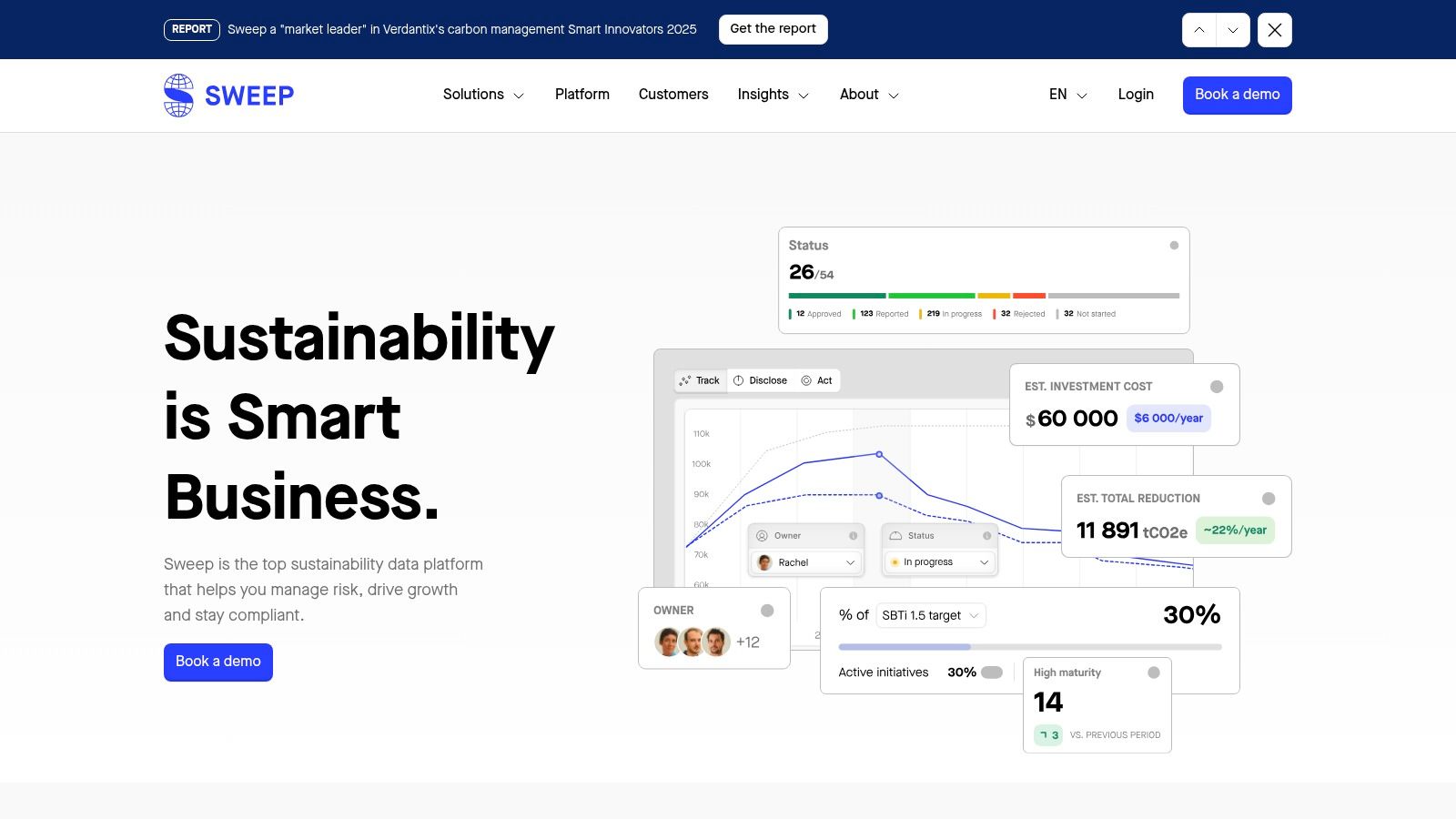
The platform’s strength is its guided methodology, which is particularly beneficial for teams navigating CSRD for the first time. It provides step-by-step guidance and utilises generative AI to suggest draft answers and policy language, accelerating the content creation process while maintaining investor-grade data controls. Recognition from industry analysts like Verdantix and IDC provides external validation of its capabilities, which can be a key factor in procurement decisions. Sweep’s emphasis on creating a clear audit trail ensures that every step, from data collection to final report generation, is transparent and defensible.
Key Information
- Best For: European organisations or multinationals with significant EU operations seeking a guided, ESRS-native platform for their first CSRD reporting cycle.
- Pricing: Bespoke, quote-based pricing tailored to organisational size and specific module requirements.
- Unique Feature: A highly structured, guided double materiality assessment module that walks users through the entire process, from stakeholder engagement to impact and financial materiality scoring, directly aligned with ESRS requirements.
Pros:
- Strong ESRS Alignment: Purpose-built for CSRD, ensuring methodologies and outputs meet regulatory expectations.
- Analyst Recognition: Endorsements from Verdantix and IDC offer procurement confidence and signal a robust solution.
- EU Data Governance: As a European company, it provides strong assurances regarding data residency and GDPR compliance.
Cons:
- Bespoke Pricing: Lack of transparent pricing tiers can make initial budgeting a challenge.
- Rollout Support: Larger, more complex organisations may require additional implementation services beyond the core platform offering.
Website: https://www.sweep.net
11. Plan A
Plan A is a Berlin-based sustainability software platform that combines TÜV-certified carbon accounting with decarbonisation planning and a strong focus on European regulatory compliance. It is engineered to help businesses calculate, monitor, and reduce their carbon footprint in alignment with scientific targets, making it one of the best climate disclosure management platforms for companies prioritising rapid CSRD readiness and value realisation. The platform is particularly noted for its science-based approach and hands-on expert support.
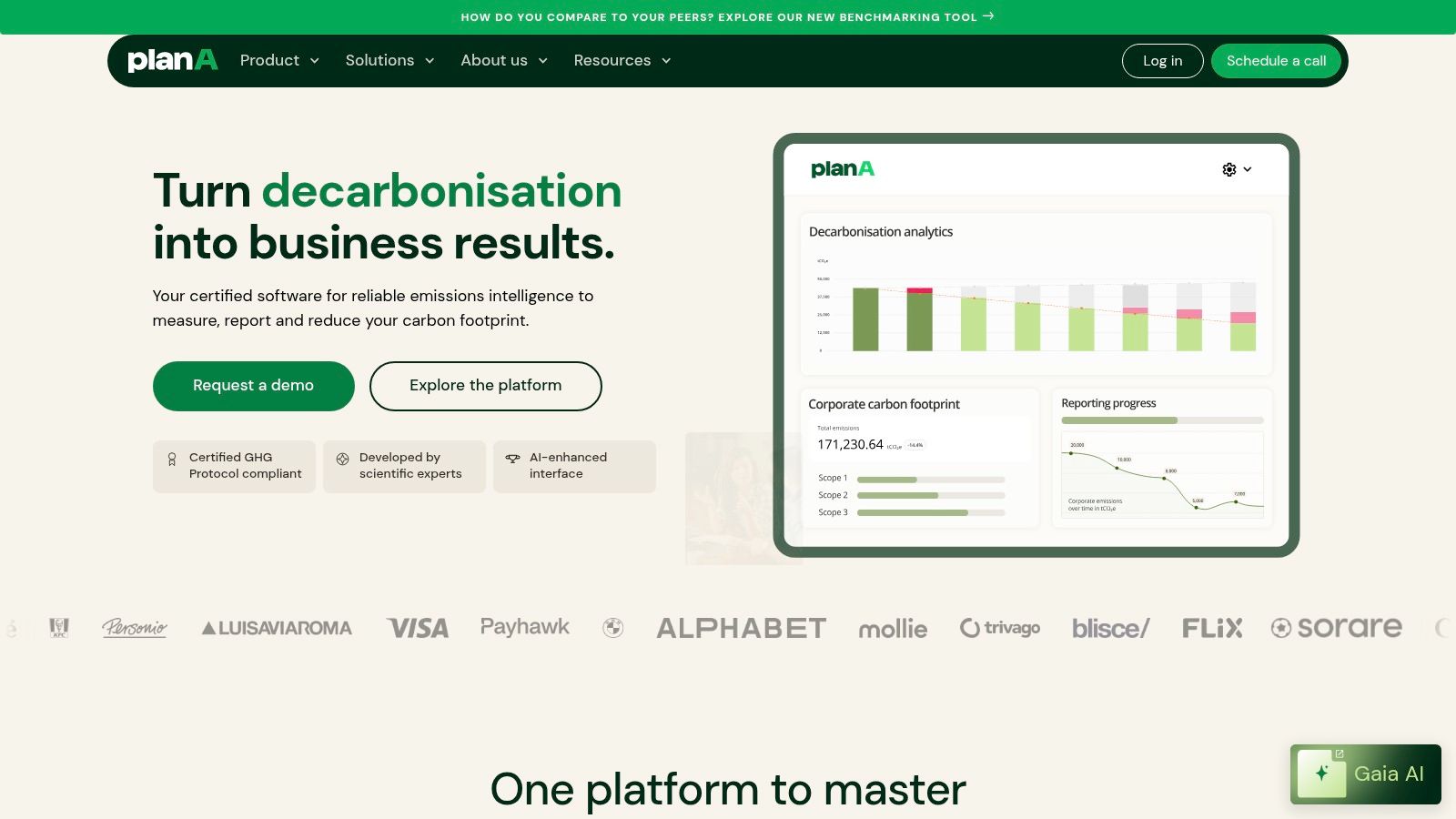
The software leverages AI to streamline data collection and analysis for comprehensive Scope 1, 2, and 3 emissions reporting, compliant with the GHG Protocol. Beyond just measurement, Plan A provides tools to set science-aligned targets and model decarbonisation pathways, turning data into actionable reduction strategies. For EU-based organisations, their specialised CSRD Masterclass and enablement programmes offer a clear, guided path to navigate the complexities of the new directive, from the double materiality assessment to final report generation.
Key Information
- Best For: Mid-sized to enterprise EU companies seeking a science-based platform with strong expert support for CSRD and decarbonisation.
- Pricing: Quote-based. Plan A follows a demo-first sales approach to tailor the solution to specific business needs.
- Unique Feature: TÜV Rheinland certification for its carbon accounting methodology, providing a high level of scientific credibility and assurance for reporting.
Pros:
- EU-Native Expertise: Deeply aligned with CSRD, SFDR, and other European regulations and expectations.
- Focus on Action: Strong emphasis on decarbonisation planning and reduction, not just reporting.
- Expert Services: Offers significant hands-on support, including a CSRD Masterclass and dedicated sustainability experts.
Cons:
- Pricing Transparency: The lack of public pricing and a demo-first model can make initial evaluation difficult.
- Newer Market Entrant: May not have the same breadth of third-party integrations as more established global platforms.
Website: https://plana.earth
12. Greenly
Greenly positions itself as an accessible, end-to-end CSRD reporting workspace, specifically engineered to guide organisations through the entire compliance journey. It streamlines complex processes like the double materiality assessment (DMA) and gap analysis with intuitive workflows and AI-guided data collection, making it a strong contender among the best climate disclosure management platforms for companies grappling with new EU regulations. The platform is designed to manage the full reporting cycle, culminating in audit-ready, exportable reports.
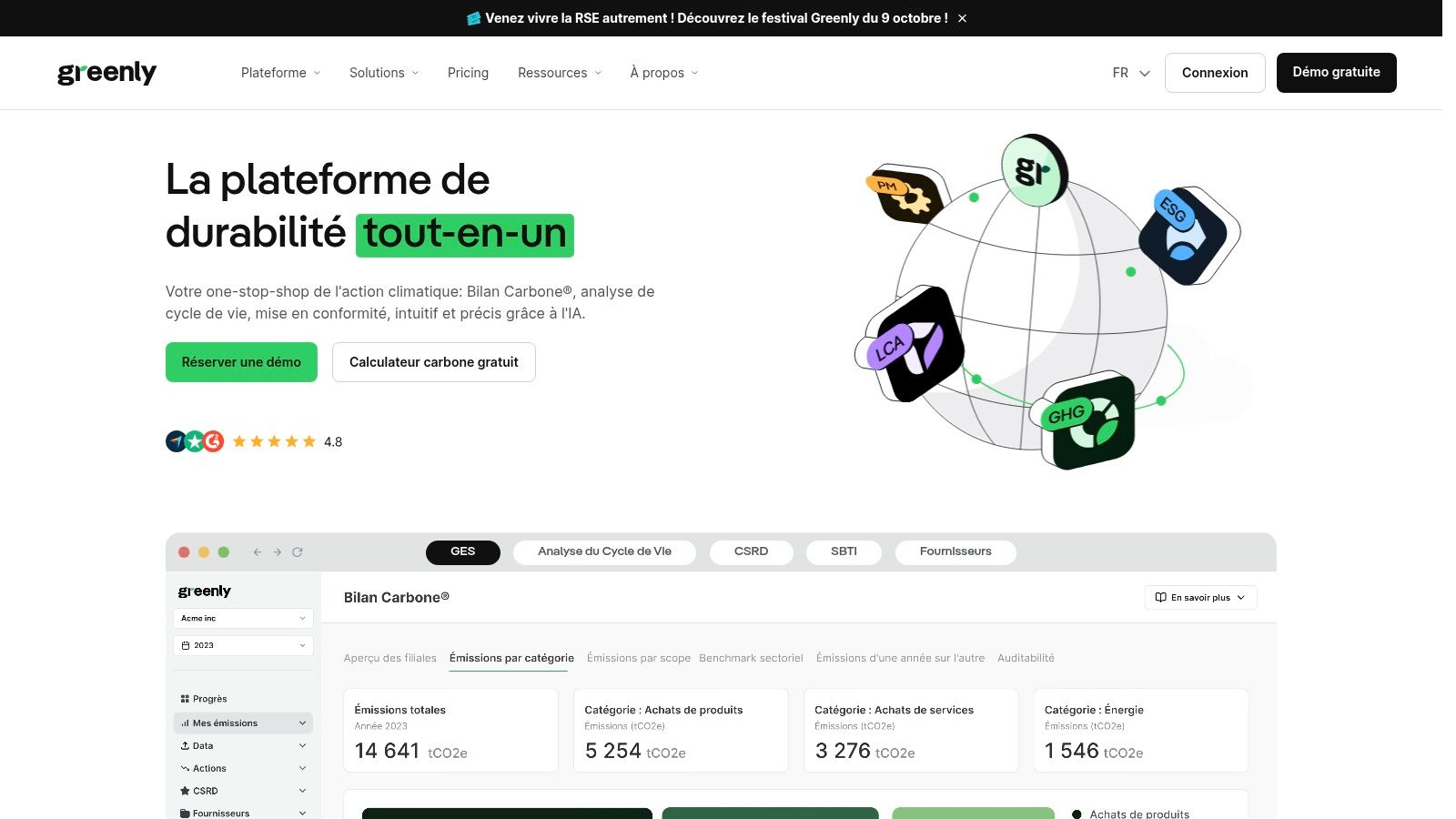
What sets Greenly apart is its focus on demystifying CSRD. It offers free tools like a CSRD Checker and a dedicated "CSRD Export" add-on, lowering the barrier to entry for businesses starting their compliance process. This EU-centric approach is particularly beneficial for Czech entities and others within European supply chains that need a solution deeply aligned with ESRS standards. The platform supports various company sizes, including specific provisions for SMEs (VSMEs), ensuring scalability as reporting needs evolve.
Key Information
- Best For: SMEs and mid-sized European companies needing a guided, streamlined solution specifically for CSRD compliance.
- Pricing: Subscription-based, quote required. Pricing is not publicly listed and may vary across third-party sources.
- Unique Feature: Free, self-serve CSRD tools and add-ons that allow organisations to assess their readiness and export data without an initial financial commitment.
Pros:
- Strong CSRD Focus: The entire platform is built around the steps of ESRS compliance, from DMA to XBRL export.
- Accessible Tools: Offers valuable free resources that help organisations begin their CSRD journey.
- EU-Centric Design: Well-suited for Czech and other EU-based companies navigating regional regulations.
Cons:
- Opaque Pricing: Lack of public pricing information makes initial budget planning difficult.
- Newer Market Presence: May have a less extensive track record compared to more established enterprise platforms.
Website: https://greenly.earth
Top 12 Climate Disclosure Platforms Feature Comparison
| Platform | Core Features/Characteristics | User Experience/Quality ★ | Value Proposition 💰 | Target Audience 👥 | Unique Selling Points ✨ |
|---|---|---|---|---|---|
| 🏆 Carbonpunk | AI-driven real-time emissions tracking, route optimization, automated ESG reports (GHG/TCFD/CDP) | ★★★★★ 95%+ accuracy, custom dashboards | Contact for quote, high ROI via emission cuts | Large enterprises with complex supply chains | Seamless logistics integration, 30% emission reduction |
| Workiva | ESG/financial integrated reporting, direct CDP API | ★★★★ Audit-grade workflows across teams | Quote-based pricing | Enterprises needing multi-team audit workflows | Big Four accelerators, strong compliance support |
| Persefoni | Scope 1-3 carbon accounting, AI data quality tools | ★★★★ Fast onboarding, user-friendly | Free Pro plan, paid advanced features | SMEs and enterprises | Free full Scope 1-3 coverage, AI anomaly detection |
| Watershed | CSRD/ESRS disclosures, supplier data engagement | ★★★★ Strong EU regulatory focus | Sales-led pricing | EU multinationals | Supplier biodiversity & waste data, assurance-ready |
| IBM Envizi ESG Suite | ESG data capture, multi-framework reporting | ★★★★ IDC-recognized, audit trails | Enterprise pricing, significant effort | Large enterprises | Unified ESG data system, broad framework support |
| Wolters Kluwer CCH Tagetik | Finance-linked ESG, CSRD & EU Taxonomy content | ★★★★ Award-winning CPM integration | Enterprise license | Corporates needing deep CPM integration | Prebuilt GHG calculation, Enablon ESG ops integration |
| Diligent ESG | Carbon calculator, CSRD modules, AWS Marketplace | ★★★★ Transparent pricing via AWS | Clear tiered packages via AWS Marketplace | Enterprises plus AWS users | 70k+ emissions factors, governance expertise |
| Datamaran | AI double materiality & stakeholder mapping | ★★★★ Materiality audit trail support | Quote-based, complementary tool | Enterprises focusing on materiality | Fast CSRD materiality updates, strong audit trails |
| Nasdaq Metrio | ESG data collection, stakeholder-ready websites | ★★★★ Transparent ROI modeling | Module-based pricing | Global enterprises | Market infrastructure backing, Forrester ROI study |
| Sweep | CSRD workflows, generative AI, ESRS focus | ★★★★ Analyst-recognized EU compliance | Bespoke pricing | EU large organizations | AI-generated answers, EU data governance |
| Plan A | TÜV-certified carbon accounting, decarbonization | ★★★★ Fast time-to-value, expert services | Demo-based pricing | EU companies | TÜV certified, strong EU enablement programs |
| Greenly | CSRD workspace, AI-guided data, XBRL export | ★★★★ Self-serve tools, SME support | Subscription pricing varies | SMEs and mid-sized EU firms | Free CSRD Checker, full ESRS compliance |
Making Your Final Decision: Turning Disclosure into a Strategic Asset
Navigating the landscape of the best climate disclosure management platforms can feel overwhelming, but making an informed choice is a pivotal step in transforming your organisation's sustainability journey from a compliance exercise into a strategic advantage. As we have explored, the market offers a diverse array of solutions, each with distinct strengths tailored to different organisational needs, sizes, and maturity levels. From comprehensive, enterprise-grade systems like Workiva and IBM Envizi to more specialised, tech-forward platforms like Watershed and Persefoni, the right tool exists to meet your specific challenges.
The key takeaway is that selecting a platform is not merely about purchasing software; it is about investing in a central nervous system for your climate strategy. The most effective solutions transcend basic data collection and reporting. They provide the analytical power to uncover operational efficiencies, identify hidden risks within your supply chain, and communicate your progress transparently to stakeholders, investors, and regulators. The decision should be driven by a clear understanding of your primary objectives, whether that is navigating complex regulations like the CSRD, decarbonising a sprawling supply chain, or engaging investors with robust, auditable data.
Key Considerations Before You Commit
Before finalising your decision, it is crucial to move beyond feature-for-feature comparisons and consider the holistic impact on your organisation. A platform may have an impressive list of capabilities, but its true value is realised only through successful implementation and adoption.
Here are the critical factors to weigh during your evaluation process:
- Scalability and Future-Proofing: Your climate reporting needs will evolve. Does the platform have the capacity to grow with your organisation and adapt to future regulations and frameworks? Consider its roadmap for incorporating new standards and its ability to handle increasing data volumes and complexity.
- Integration Capabilities: A siloed platform creates more work, not less. Assess how easily the software integrates with your existing systems, such as ERPs, accounting software, and operational data sources. Seamless integration is paramount for ensuring data accuracy and automating workflows.
- Implementation and Support: What level of support does the vendor offer during the onboarding process and beyond? Look for a partner who provides comprehensive training, dedicated customer support, and strategic guidance to help you maximise the platform’s value. A complex tool without proper support can quickly become a costly shelfware.
- Specialisation and Use Case Fit: As highlighted throughout this article, specialisation matters. For logistics and supply chain-heavy businesses, a platform like Carbonpunk, with its focus on granular Scope 3 emissions, offers a distinct advantage. Conversely, finance-centric organisations might prioritise a solution like Wolters Kluwer CCH Tagetik that excels in integrating ESG and financial reporting. Match the platform’s core strengths to your most pressing challenges.
Turning Data into Actionable Intelligence
Ultimately, the goal is not just to disclose but to drive meaningful change. The best climate disclosure management platforms empower you to do just that. They transform raw data into a powerful asset that illuminates opportunities for cost savings through energy efficiency, mitigates climate-related risks, and strengthens your brand reputation.
By choosing the right partner, you equip your team with the tools needed to move with confidence in an increasingly complex regulatory environment. You build a foundation of trustworthy, auditable data that stands up to scrutiny and provides a clear, compelling narrative of your organisation's commitment to a sustainable future. This strategic approach ensures that your investment delivers returns not only in compliance but in long-term business resilience and value creation.
Ready to master your Scope 3 emissions and turn supply chain complexity into a competitive advantage? Discover how Carbonpunk’s specialised platform provides the granular, actionable data needed to drive decarbonisation where it matters most. Visit Carbonpunk to see how our targeted solution can transform your climate disclosure strategy.